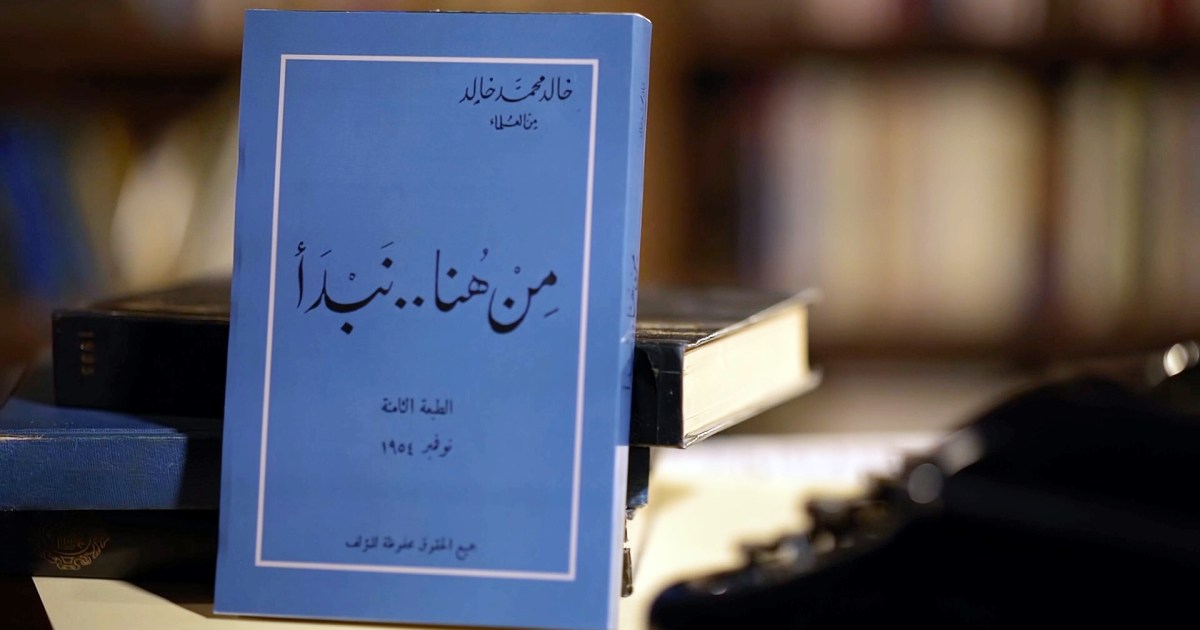In the early 1950s, the corridors of Al-Azhar Mosque and religious institutions in Egypt witnessed a state of controversy following the publication of a book titled “From Here.. We Begin” by the author Khaled Mohamed Khaled, who was 30 years old.
The book included 4 chapters, in which the writer presented his thoughts on the relationship of religion with the state, social conditions in Egypt, and how they were affected by the performance of traditional religious institutions and their men.
Khaled Mohamed Khaled's book sparked a lot of controversy and discussion because of his bold ideas, and the Public Prosecution at that time ordered the seizure of the book and prevented its circulation, after a complaint submitted by the head of the Fatwa Committee at Al-Azhar University.
Also, some clerics saw in it an attack on Islam and a criticism of many of its constants.
In this regard, Professor of Faith at Qatar University Ahmed Zayed says that the book “From Here.. We Begin” appeared bearing a shock to the masses of Muslims at the beginning of its appearance,
but others saw that the book - which gained popular popularity and carried out 4 editions of it in the year of its publication - is a necessary development for religious discourse , and a more open understanding of the teachings of Islam.
In the first chapter, "Religion, not Priesthood," the writer criticized what he called the "religious priesthood" in Egyptian society, and the role that some clerics play in "legitimizing" the policies of impoverishment and support for interests and ruling regimes in the name of religion.
In the second chapter, "Bread is Peace," the writer saw that Islam tends towards socialist ideas that support justice.
According to Zahia Gweru, professor of civilization at Manouba University, the writer's thinking about socialism was motivated by his awareness of the Egyptian society's need for a more just system that preserves their dignity for the majority of Egyptians.
However, the writer’s saying that Islam tends to socialism means that some of the bright aspects of socialism intersected with some Islamic teachings, but Islam is the origin;
Zakat (one of his five obligations) came at the top of social reform.
In the third chapter, “The Nationalism of Governance,” the writer presented his vision of the relationship between religion and the state, indicating that religious governments harm both Islam and the state, and that separating them preserves the sanctity of religion and its positive impact on people’s souls, and opens the way for a modern civil state.
Professor of Jurisprudence at Sultan Muhammad Al-Fattah Muhammad Ayman Al-Jammal criticizes what the writer went to in the third chapter, and says that he carried an abnormal idea when he saw that religion is not right for judgment to be built on, stressing that religion is a comprehensive view of life, and it is the basis on which judgment is built.
Dr. Muhammad al-Saghir, advisor to the former Egyptian Minister of Awqaf, disagrees with writer Khaled Muhammad Khalid’s vision;
Because there is no religious government in Islam in the Western priestly sense.
After the controversy raised by the book "From Here.. We Begin";
Khaled Muhammad Khaled issued a new book after 30 years entitled "The State in Islam", in which he presented a new reading of the relationship of religion to the state, and saw that what he presented in his early years were enthusiastic ideas.
The writer admits - in an audio recording carried by the episode "Outside the Text" - that he took a risk when he said "Islam is a religion, not a state", and that he ended up with a certain conviction that "Islam is a religion and a state."

